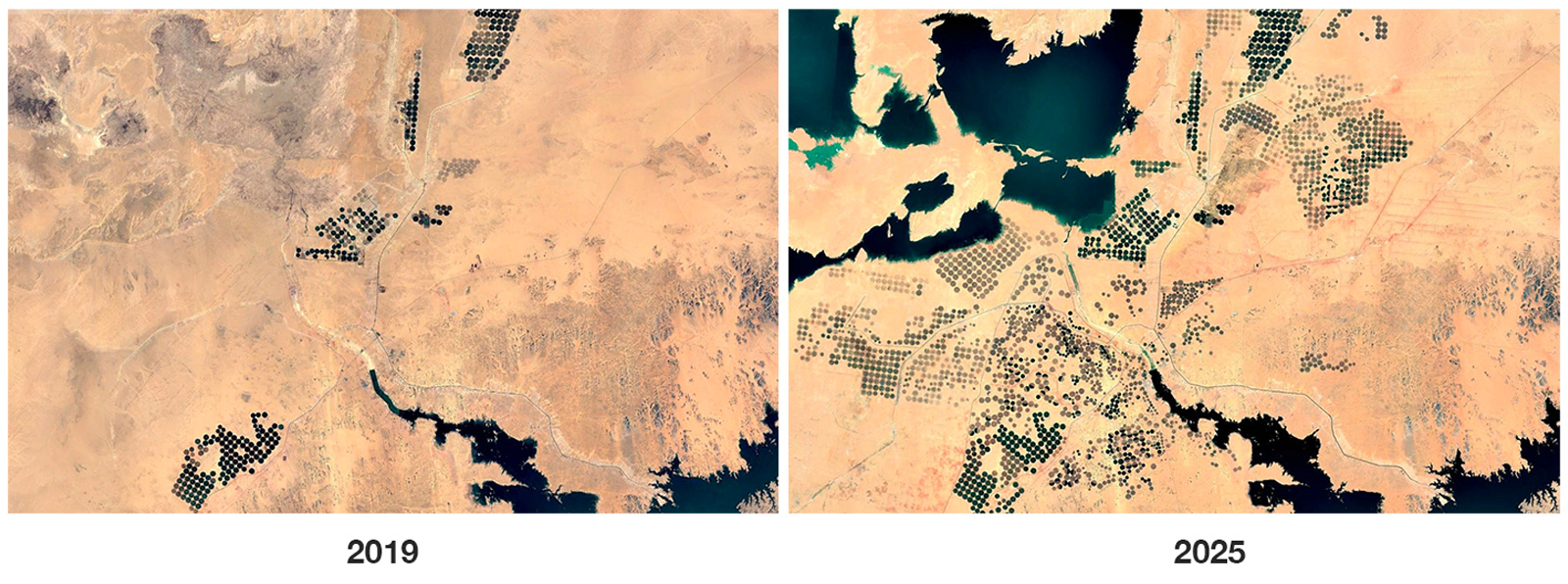With a population exceeding 113 million, the Egypt’s dependence on food imports, especially wheat, has become increasingly vital. In partnership with the Food and Agriculture Organization (FAO), the government recognised the need to enhance national food security and ensure sustainable access to water for its growing population. Egypt needed a solution—not just for food, but for sustainable access to clean water.
Unlocking the Potential of the Desert
Not long ago, much of Egypt’s Western Desert was a vast, empty expanse—dry, unforgiving and incapable of sustaining life. Today, thanks to two massive water projects, Toshka and New Delta, these lands are turning green. More than just irrigation, these projects bring clean water to communities, fuel agriculture, and create new opportunities for families who once relied solely on the Nile River’s limited reach. This transformation isn’t just a national achievement; it aligns with the United Nations Sustainable Development Goal 2 (Zero Hunger) and Goal 6 (Clean Water and Sanitation), ensuring food and water security for a growing population.
The Egyptian government responded with Toshka and New Delta, partnering with Borouge to create high-quality materials for two ambitious projects designed to reclaim desert land, expand farming, and secure clean water access for people and industries. These projects directly support SDG 2 by strengthening local food production and SDG 6 by improving water infrastructure, reducing waste, and increasing access to safe drinking water.

Bringing Water Where It’s Needed Most
The Toshka Project, launched in 1997, uses the Mubarak Pumping Station—one of the world’s largest—to channel water from Lake Nasser into newly built canals. These channels carry life-giving water deep into the desert, turning arid land into thriving farmland and ensuring nearby communities have a reliable source of clean water.
The New Delta Project expands on this effort, aiming to irrigate over one million feddans (420,000 hectares), which is equivalent to approximately 225,000 football fields, while ensuring potable water reaches fast-growing communities and industrial zones.
While expanding farmland is critical, success depends on strong, efficient water networks. Traditional piping systems failed under Egypt’s intense heat and shifting desert soil, leading to leaks and costly maintenance. To ensure long-term success, these projects required modern, high-quality materials built to withstand the region’s extreme conditions.
One of the game-changing elements of these projects has been the use of advanced polymer-based piping solutions. Traditional pipes often failed in Egypt’s harsh climate, leading to water loss and expensive repairs. The introduction of Borouge’s advanced BorSafe™ materials changed that. These high-performance pipes provide exceptional resistance to stress cracking, minimising leaks and failures. They offer more uniform wall thickness, ensuring reliable water flow, and corrosion-free durability, reducing long-term maintenance costs. Unlike traditional materials that degrade over time, these polymer pipes last longer, require fewer repairs, and provide a cost-effective, sustainable solution for Egypt’s growing water infrastructure.
"We chose Borouge's products over competitors because of their superior quality and durability. Their advanced materials ensure our projects are not only sustainable but also resilient, meeting the highest standards of performance. Borouge's commitment to innovation and sustainability aligns perfectly with our vision for a greener future," explains Ali Hashem, the Chairman of Gulf Manufacturers Company.
Changing Lives, One Pipeline at a Time
For Egyptian farmers, reliable water access has changed everything. In the past, unpredictable water supply meant unstable harvests, financial struggles, and even threats to survival. Today, fields that once lay dry now produce wheat, corn and vegetables. Water flows consistently to homes that previously relied on uncertain sources.
The impact goes beyond farming. New water infrastructure has created thousands of jobs, not just in agriculture, but in construction, logistics, and water management. As clean water becomes more available, new communities grow, reducing pressure on overcrowded cities. The combined effects of SDG 2 and SDG 6 are clear: Egypt is becoming more self-sufficient, and millions of people are gaining access to the resources they need to thrive.
This transformation isn’t just about engineering, it’s about resilience, sustainability, and securing a better future for generations to come.
A Future Built on Water and Food Security
Egypt’s deserts are no longer lifeless. Water flows where it never did before. Farms thrive. Communities grow. Industries find new opportunities. With projects like Toshka and New Delta and advanced solutions from Borouge, the vision of a food-secure, water-secure Egypt is becoming reality. This isn’t just about pipelines or farmland; it’s about people, progress and the power of innovation. By advancing SDG 2 and SDG 6, Egypt is showing the world that even the harshest landscapes can be transformed with the right investment, technology and vision.
Thanks to Borouge's support in these infrastructure projects, over 4 million people in Egypt now enjoy improved food and water security.
